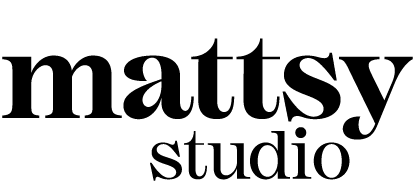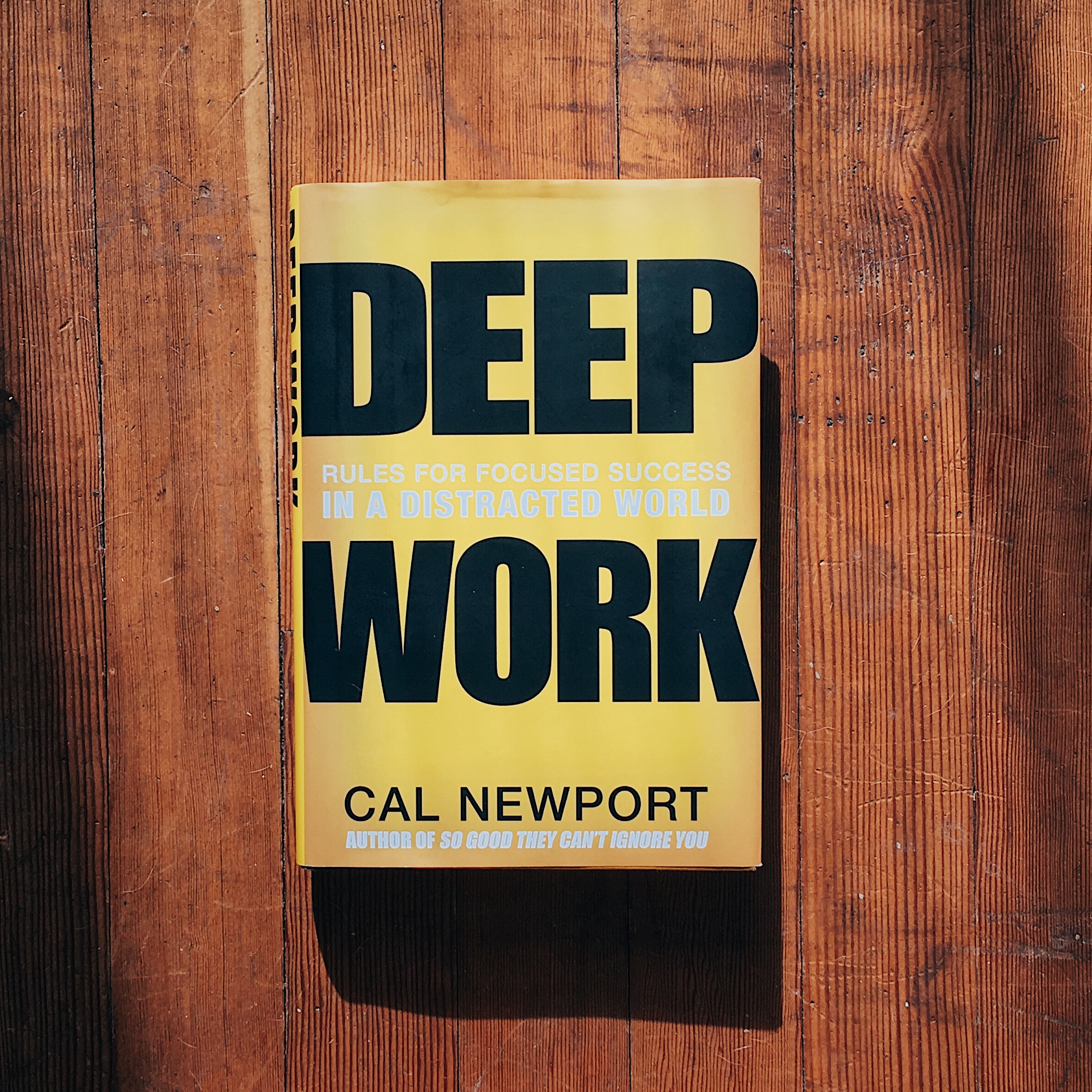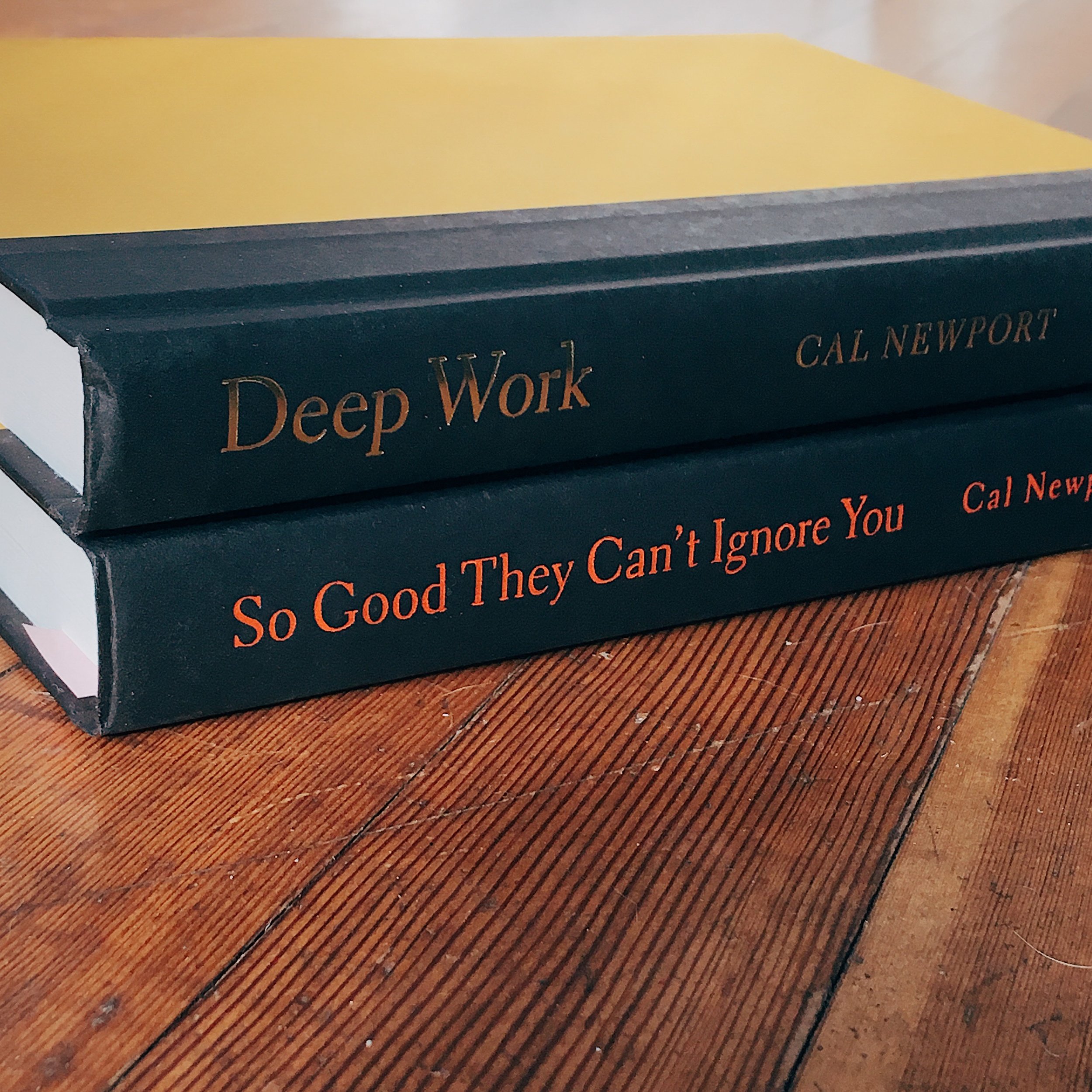Deep Work by Cal Newport
The Book in Three Sentences
You don’t need a rarified job, you need a rarified approach to your work. The ability to concentrate intensely is a skill that must be trained; creative insight in professional life is about making a commitment to training this ability every single day. To make the most out of your deep work sessions focus on only a few important goals, build strict rituals, and implement a fixed-schedule to determine what rules and habits are needed to satisfy your constraint.
To be a Master You Must Produce
Two Core Abilities for Thriving in the New Economy:
The ability to quickly master hard things.
The ability to produce at an elite level, in terms of both quality and speed. (p29)
If you don’t produce, you won’t thrive—no matter how skilled or talented you are. (p32)
It’s not about how much you work. You can optimize your life by consolidating your work into intense and uninterrupted phases. On page 40, Newport offers the formula:
High-Quality Work Produced = (Time Spent) x (Intensity of Focus)
Don’t Get Trapped Doing Shallow Work
It’s easy to respond to emails all day and it feels productive. It’s harder to take a more thoughtful approach and figure out what you really should be working on, and for how long. (pp58–59)
In the absence of clear indicators of what it means to be productive and valuable, many knowledge workers instead try to look busy in a visible manner. (p64)
We place a lot of emphasis in today’s culture on ‘job description’. It’s not the specifics of the job you choose that matters. You don’t need a rarified job, you need a rarified approach to your work. Focus on spending quality time cultivating your skill. (p91)
Selecting Your Technology ‘Tools’
There’s a lot of digital communication in your life is not enriching. If you’re a knowledge worker, treat your tool selection with the same level of care as a skilled craftsman. Adopt a tool only if its positive impacts substantially outweigh its negative impacts. (p191 and p193)
By spending time doing low-impact activities like ‘liking’ Facebook or Instagram posts, you’re taking time away from higher impact activities like taking a good friend out to dinner or spending real, quality time with them. (pp202–203)
Limit Shallow Work During your Day Job
A general ratio of time spend on shallow work for most people in a non-entry-level knowledge work position is 30–50%. You don’t want to spend the majority of your time doing unskilled tasks. But be aware that less than 30% of your time you may be reduced to ‘hermit’ status who thinks big thoughts but never responds to emails. (pp232–233)
Ask your boss about how long you should devote to unskilled, shallow work. It’s wasteful to pay a highly trained professional to send emails and attend meetings all day. (p234)
You may want to reconsider your current job if your boss does not value depth. You will not succeed in our current information economy if your job doesn't support deep work. (p235)
Concentrate
The ability to concentrate intensely is a skill that must be trained. Creative insight in professional life has little to do with a onetime decision to think deeper and everything to do with a commitment to training this ability every single day. (p157)
“Efforts to deepen your focus will struggle if you don’t simultaneously wean your mind from dependence on distraction*.” (p157)
*Is this a seed for Newport’s next book, Digital Minimalism?
People who multitask all the time can’t filter out irrelevancy. They can’t manage a working memory. They’re chronically distracted. (p158)
Modes of ‘Deep Work’
Bimodal Philosophy — deep work is treated similarly to a monastic approach, as demonstrated by Carl Jung and Adam Grant (Wharton Business School professor). While the bimodal philosophy is marked by extreme productivity, the minimum unit of time is often at least one full day. (pp108–109)
Rhythmic Philosophy — sometimes referred to as The Chain Method (Newport), Seinfeld Method or Seinfeld Strategy (James Clear ), this method implies getting into a routine of practicing every single day. In this philosophy, doing something consistently is more important than the amount of time spent. Seinfeld keeps a calendar on his wall and every day that he writes joke he crosses out the date with a big ‘X’. “After a few days you’ll have a chain… and then your only job is to not break the chain.” (pp110–111)
Journalistic Philosophy — this approach is a nod to those trained to shift into a writing mode on a moments notice. Based on the work ethic of journalist Walter Isaacson, you fit deep work into your schedule wherever you can. (p114)
Build a Ritual
To make the most out of your deep work sessions, build strict rituals. “Great creative minds think like artists but work like accountants.” (p119)
There’s no correct ritual, but there are three important aspects that an effective ritual must address (pp119–121):
Where you’ll work, and for how long — this can be as simple as putting a sign on your office door, or, even greater benefit, it may be a whole other quiet place you go.
How you’ll work once you start — rules and processes to reduce the amount of work your brain has to do to establish and keep focus.
How you’ll support your work — access to what you need to maintain the energy required. This might be a great cup of coffee, the right snacks, or walks to help keep the mind clear.
Execute
The 4 Disciplines of Execution (pp136–141):
Focus on a few ‘wildly important’ goals and don’t spread yourself too thin.
Act on lead measures and not lag measures. For example, “publish a book this year” gives you little to work on in your day-to-day life (lag measure). But tracking your hours spent doing deep work (lead measure) immediately generates a noticeable, motivating change towards completing the long-term metric. Lead measures focus on the new behaviours that will drive success on the lag measures.
Keep a compelling scoreboard. Track your milestones and correlate these to your logged hours to see tangible results. This also helps you get a sense of how long something actually takes.
Create a cadence of accountability. Be accountable to someone with scheduled meetings, or regularly review on your own.
Maintain a Strict Endpoint to Your Workday
You need downtime: it aids in insights; helps to recharge your energy to work deeply; and the work that happens in your evening downtime usually isn’t very important. (pp144–150)
Once your workday ends, you must make sure all the open loops are closed. Your ritual should ensure that every incomplete task, goal, or project has been reviewed and you have confirmed that either (1) you have a plan your trust for its completion, or (2) its captured in a place you trust.* (p151)
* This follows the same principles that David Allen outlines in Getting Things Done.
Shutdown rituals can become annoying as they add extra time to the end of your workday, but the payoff is remarkable. (p154)
Use Productive Meditation
The goal of productive meditation is to take a period where you’re occupied physically but not mentally—walking, running, cycling, showering—and focus on a single well-defined professional problem. As in mindfulness meditation, you continue to bring your attention back to the problem at hand when it wanders. (p170)
Productive meditation will take practice! The first few times you do this you might not have much to show for it. Like any form of meditation, it takes practice to produce real results. (p171)
Don’t get caught in a loop—if you notice you're rehearsing the same idea/problem over and over, simply notice it and move on to the next step. (p172)
Implement Fixed-schedule Productivity
Instead of attempting to cram as much work as possible into your workday, the fixed-schedule sets a limit (i.e. 40 hours a day) and works backwards to determine what rules and habits are needed to satisfy this constraint. (p238)
Much of the stress suffered in your job is self-imposed—see Newport’s thoughts or Radhika Nagpal on page 237–238. This strategy can eliminate much of the unneeded shallow work described above.
Understand that a response is not always expected. Just because your boss is clearing their inbox at night doesn’t mean they expect you to respond! By implementing a fixed-schedule, you can relax once you leave the office and tackle the emails the next day in an efficient time block. (p241)
Savour your Wins
Stanford psychologist Laura Carstensen’s conducted a study to demonstrate that elderly people are happier when compared to their younger counterparts because they have trained themselves to ignore the negative and savour the positive. (This was proved through fMRI imaging and study of the amygdala—center of emotion—and eliciting positive and negative images, see p78).



